How the Rolling Stones’ ‘Steel Wheels’ Conquered Rock Radio (And the Birth of the Promo 12″ Single)
by Greg Brodsky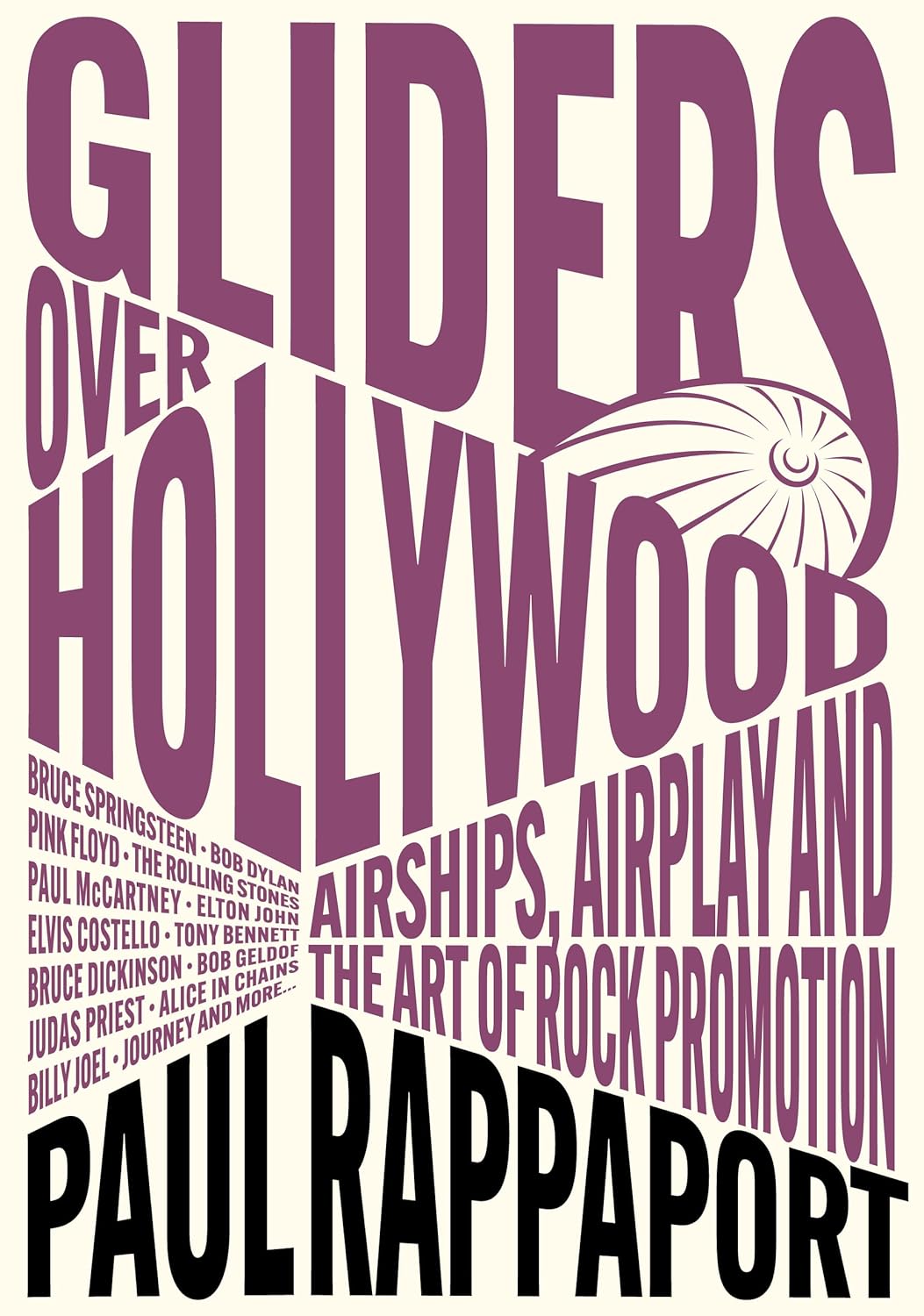 Paul Rappaport, who enjoyed a storied career in rock radio promotion for decades at Columbia Records during the genre’s glory days of multi-Platinum sales and sold-out arena tours, has published a book, Gliders Over Hollywood: Airships, Airplay, and The Art of Rock Promotion. The title, which arrived on April 15, 2025, via Jawbone Press, is the executive’s first-hand account of guiding the top label’s promotional efforts to album-rock stations for releases by Bob Dylan, Bruce Springsteen, Pink Floyd, the Rolling Stones, Elvis Costello, Billy Joel, Judas Priest and scores more. It’s available in the U.S. here and in the U.K. here.
Paul Rappaport, who enjoyed a storied career in rock radio promotion for decades at Columbia Records during the genre’s glory days of multi-Platinum sales and sold-out arena tours, has published a book, Gliders Over Hollywood: Airships, Airplay, and The Art of Rock Promotion. The title, which arrived on April 15, 2025, via Jawbone Press, is the executive’s first-hand account of guiding the top label’s promotional efforts to album-rock stations for releases by Bob Dylan, Bruce Springsteen, Pink Floyd, the Rolling Stones, Elvis Costello, Billy Joel, Judas Priest and scores more. It’s available in the U.S. here and in the U.K. here.
Gliders Over Hollywood tells the exhilarating story of a blue-collar kid who grew up in thrall to rock ’n’ roll, who found himself right in the middle of many of his musical heroes’ lives as he became the most renowned rock promotion man in America.
“Rap,” as the artists as well as his friends and colleagues call him, is a gifted storyteller and delights in sharing how he played a crucial role in developing game-changing campaigns that led to the establishment of many artists’ careers and in many cases furthered the sustained success of A-listers.
“It’s not a kiss-and-tell book,” Rappaport tells Best Classic Bands. “It’s a celebration about working in a business that was like going to Disneyland every day.”
In that era, from the early ’70s and through the rest of the century, all of the major labels (and plenty of indies) would get “hot,” with a period of success on the charts that would translate to multi-Platinum albums. Only Warner Bros. and Columbia were able to stay on top consistently with the labels’ promotion, sales, A&R, marketing and publicity teams in constant lockstep to establish albums, artists and ultimately careers. At Columbia, if a rock album was in the pipeline, an artist’s manager understood that it would have a shot at rock radio despite the heavy competition, thanks to a push that would stand out at the format.
“I was always encouraged to be creative and to think out-of-the-box,” says Rappaport. “I have a big imagination,” he adds. “I wanted to do things that no one had ever done.” At one point, after much sustained success, his industry colleagues named him the greatest rock promotion exec of all time.
When album radio first began in the ’60s, “those were the glory days of FM,” says “Rap.” When the labels delivered albums, every jock programmed their own show. “You had to kind of hang out all day and night [at a station] and if you knew the disc jockey, like Jim Ladd who started at KNAC in Long Beach [Calif.], I knew the kind of music he liked. So, I’d hang out with him at night during his air shift.” When Rappaport was excited about a new Columbia release, he’d say, “I think you may want to check this out.”
“If you became friends with these folks, you gained credibility and they trusted your integrity.”
The labels would affix a horizontal white sticker across the bottom of the album cover that listed the tracks and each side and the stations checked off what they wanted to play. This went on throughout the ‘70s.
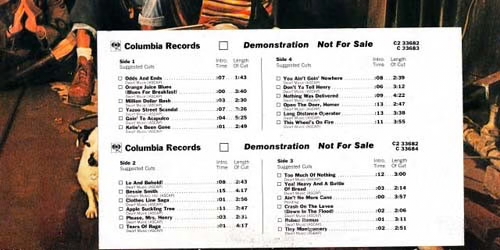
As the format grew and evolved to Album Oriented Radio, commonly referred to as AOR, “I’m thinking, ‘Wait a minute… We’re sending these records to people. They’re playing whatever they want, [sometimes] three tracks deep.’ If they play all these songs in the same month or two, in no time the album becomes passe and then it’s on to the next new thing.
“I’m thinking to myself, ‘Why aren’t we in control of our own destiny? These Top 40 guys put out a single from an album. Then they put out another single. But they’re in control of when they release these things. Why can’t we do this for FM radio?’
“I came up with this idea of a [promotional] 12” single that we could send people for what we wanted them to play first, the track that would be the best introduction to a new album.” Rap called his West Coast rock promotion exec, Jim McKeon, who had previously been a radio programmer. “I explained, ‘We can’t send [AOR stations] 45s because it’s too big a hassle for them to change the turntable speed” to use one of those adapters for the big hole just to play one track. “I want to send them something they can just put on the turntable but with only one track. A 12″ single. How do we do that?’” McKeon suggested asking the pressing plant to cut the 12” so that at the song’s end the needle in the tone arm will just track in a circular groove until the jock has time to take if off the turntable.
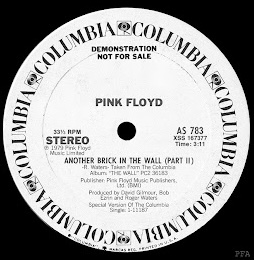 Rap called the CBS Records pressing plant in Georgia and explained what he needed. “I thought they would extend a song’s groove across the entire surface, but what I got back was one track about 3/4 of an inch like on a regular album. The rest was shiny black vinyl. I thought, ‘This is a f**king waste of vinyl. But it works!’ So, we developed the 12” promotional single, which became an industry standard. What happens in the first two weeks of heavy airplay when an album isn’t in the stores yet? Excitement builds, and when the record is finally released, there’s a storm of people that immediately run into the stores. Now you’ve got momentum. And then you can decide when you want to release track two, and track three, if you have a deep record. And what does that do? Not only have you gotten people’s attention that there’s a new record but now you’re in charge of what the public is hearing when you want them to.”
Rap called the CBS Records pressing plant in Georgia and explained what he needed. “I thought they would extend a song’s groove across the entire surface, but what I got back was one track about 3/4 of an inch like on a regular album. The rest was shiny black vinyl. I thought, ‘This is a f**king waste of vinyl. But it works!’ So, we developed the 12” promotional single, which became an industry standard. What happens in the first two weeks of heavy airplay when an album isn’t in the stores yet? Excitement builds, and when the record is finally released, there’s a storm of people that immediately run into the stores. Now you’ve got momentum. And then you can decide when you want to release track two, and track three, if you have a deep record. And what does that do? Not only have you gotten people’s attention that there’s a new record but now you’re in charge of what the public is hearing when you want them to.”
The albums used to burn themselves out in a month. “This was revolutionary. You could now pick your introduction track, calculate when your first track was starting to burn [out], and issue the second track and work it up the chart as the other one was starting to come down.”
In the summer of 1989, the Columbia team was gearing up for a new Rolling Stones album, Steel Wheels, and the band’s first tour in seven years. Rappaport shares a “sorry, not sorry” story about the magic he did for the record at rock radio.
“I abused the privilege of [the 12” promo single] when Steel Wheels came out. In those days, radio reported light, medium or heavy airplay to the trades for their charts and they had to tell the truth. Mind you, there was a time that they didn’t have to tell the truth (laughs) and we manipulated them [the charts]. Once I understood how to do that, I was a chart-manipulating motherf**ker.
“So Steel Wheels comes along and ever since I was 17 years-old, the Rolling Stones have meant more to me than anything. I learned how to play electric guitar by listening to Keith [Richards]. They’re my guys. I’m telling them, ‘Trust me. I’m going to do stuff on your behalf that you’ve never seen before.’ So the first track [“Mixed Emotions”] comes out and it goes to #1 because people had been waiting for a Rolling Stones album for a long time. They hadn’t toured in years and the excitement is so big the song is gonna naturally debut at #1. It’s huge. The usual move is to wait until a first single starts to burn and drop on the charts, then release the second single and work it up the charts as the first is coming down. My mentor, [Columbia promotion exec] Steve Popovich, said, ‘Rap, promote the artist but save five percent to promote yourself because it’s a fickle business and you need to look like you’re somebody.’ So I took that to heart. I was always doing sh*t that had never been done before, stuff that made the entire industry take notice.
“So, I’m thinking, ‘Not only do I want each single from Steel Wheels to reach #1… I want every one of their singles to debut at #1! So, how do you do that? Now, rock radio is used to track-by-track promotion from the labels. Nobody’s gonna play a second track until I send it. So, I’m waiting, waiting, waiting. Radio is begging me, ‘Rap, give us a second single! “Mixed Emotions” is completely burnt out and long past its due date.’
“I waited so long, and the excitement for the Stones was so great, that when I finally released the second single, ‘Rock and a Hard Place,’ all the programmers in the country switched out ‘Mixed Emotions’ and put ‘Rock’ in its place, in the heavy rotation slot. Boom! Track two debuts at #1! Everyone figured out what I did because it’s a small group of savvy promotion execs [at competing labels], and now I’m getting calls like ‘Really? Did you have to pull a stunt like that?!’ They’re all mad because I’ve locked out the #1 slot and none of their acts can get to that coveted place. I say, ‘Look, it’s the Rolling Stones, they deserve it. I had to do what I did. I’m sorry (not sorry).’”
“Now, the album is selling like hot cakes and the tour is going through the f**king roof. [The “Steel Wheels” stadium tour sold-out stadiums all over the U.S. and Canada in 1989 before doing the same in Japan, Europe and the U.K. in 1990.] Now it’s time for a third single. It’s a ballad, ‘Almost Hear You Sigh.’ I think I’m gonna get f**king killed for this but I’m going to do it one more time. So, again, I wait and I wait and it’s like a guy pulling back a bow. Finally, when I let the arrow fly, ‘Whooosh…,’ ‘Rock,’ which is burnt to a crisp, is immediately replaced with ‘Sigh’ in the heavy rotation slot. And just like before, I got the same result, ‘Almost Hear You Sigh’ debuts at #1!! Now, the phone calls are incendiary. Everyone calling their label presidents to call ours to have me fired. Because I’ve literally blocked everyone else from being #1 for three months. It was selfish. It really was. Everyone wants to be #1. Everybody should get a chance to be #1.
“I didn’t want to harm anybody else, but the Rolling Stones were making history, and I was now part of that gang. So, as far as I was concerned my plan was ‘All Rolling Stones, all the time.’ The phone calls got so bad that I had to leave the office for a day and hide out. Honestly, it was more than overuse of the 12” single, it was abuse. But the Rolling Stones are pirates, and now I was a pirate too, and our flag was the tongue and lips logo.
“And I would do it again for those guys.
“So I went backstage at the Shea Stadium show to tell them. The first guy I meet is Woody [guitarist Ronnie Wood]. ‘Hey, Rap, how you doing?” ‘Oh, I was able to do this thing for three #1s. It’s never been done before and will never be done again. People are going crazy!’
“And he goes, ‘I gotta go tell Keith… you gotta tell Keith.’ So he goes to grab Keith. In the f**king two minutes that it took Ron Wood to get Keith, he’s forgotten what I’ve told him! Probably due to his altered brain state. But he knows it’s something good. He’s like, ‘Keith! Keith! … Rap, tell Keith what you did!’ (laughs) That’s Woody. So I tell Keith, ‘No one’s ever done this. No one will ever do it again. Three rock singles debuting at #1. It’s historic. And you guys have been #1 for three f**king months!
“He looked at me and he gave me a big hug. And I’ll never forget this, he spins me around, kicked me in my butt. Spun me around again, gave me another big hug, and looked me right in the eye. ‘Can you do it again?’ I go, ‘Keith, if I do this one more time, I’ll be f**king killed.’ And then he looked at me and said, ‘Well, it is the Stones, man. Just kidding, but not really.’ If I got killed for the Stones, he’d be okay with it. Ha.
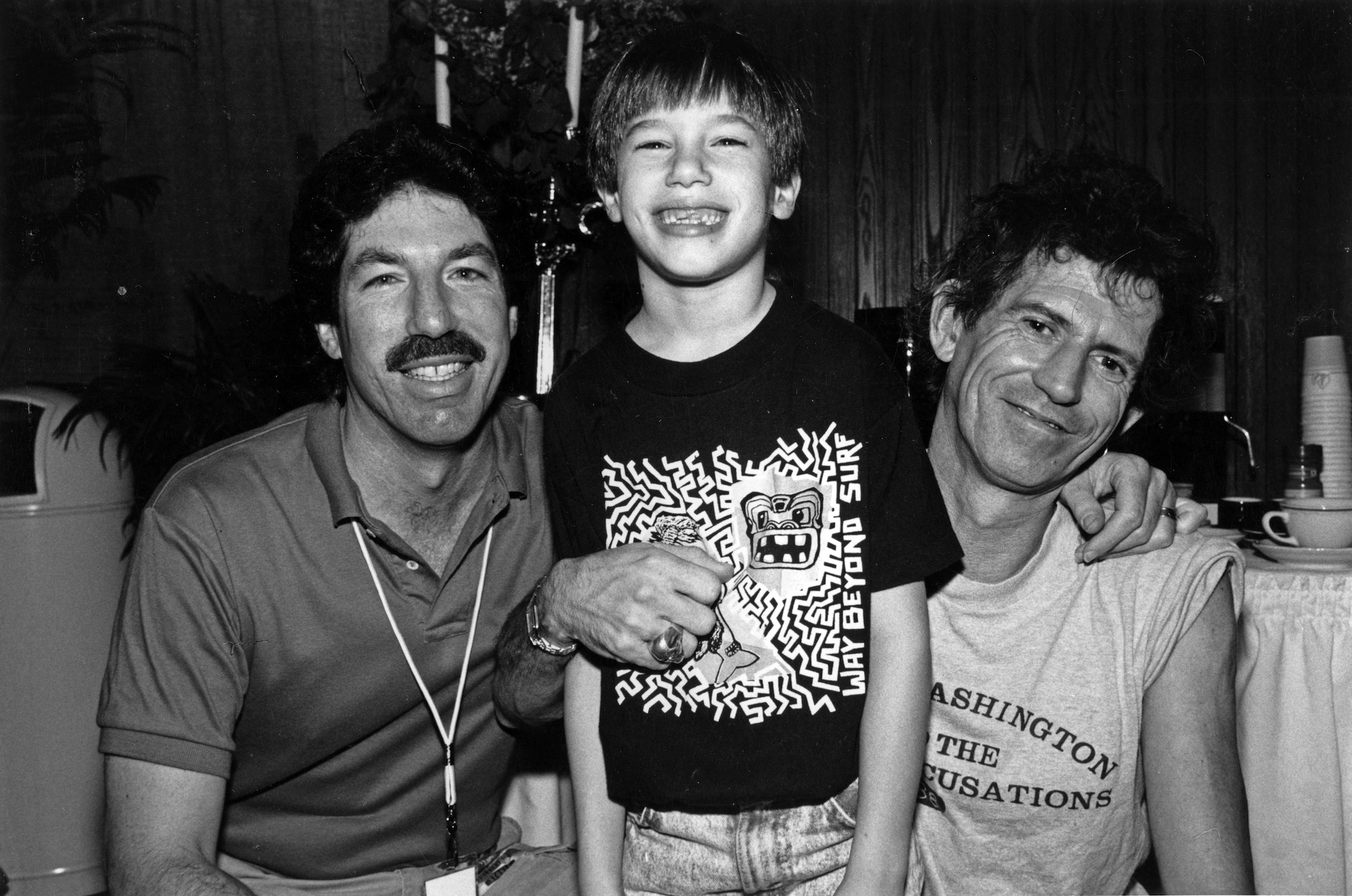
Paul Rappaport and his then- 8 year-old son, Adam, with Keith Richards backstage during the Rolling Stones’ 1989 “Steel Wheels” tour (Photo courtesy of Paul Rappaport Archives)
“Now I go and tell Mick. Mick’s all about the business. I go, ‘Mick… three #1s. Nobody’s ever done this before. It’s unprecedented. People are going nuts. (mimics Jagger) ‘Yeah, you know, don’t you think we were a little early with the third 12?’ I say, ‘Mick, stop overthinking it. Can you give me a little smile? I pressed my fingers on either side of my mouth and pushed up to feign a smile. And he starts to smile, ‘Yeah…’ But then he goes back to thinking again. I’ve only known two people like this: him and Springsteen. So, I’m wondering, “Does this guy think even more deeply about stuff that even Bruce Springsteen?! Finally, he looked up with a glint in his eye and smiled that charming Mick Jagger smile and said, ‘I know… thanks, mate, it means a lot.'”
Best Classic Bands will share more such tales from “Rap” from Gliders Over Hollywood. In the meantime, the book is available in the U.S. here and in the U.K. here.

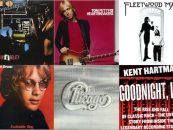
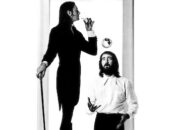

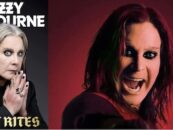

No Comments so far
Jump into a conversationNo Comments Yet!
You can be the one to start a conversation.